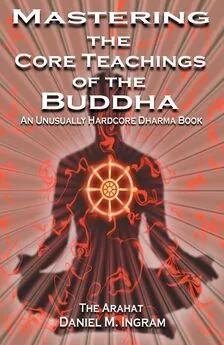Daniel Ingram - Mastering the Core Teachings of Buddha - An Unusually Hardcore Dharma Book
- Название:Mastering the Core Teachings of Buddha - An Unusually Hardcore Dharma Book
- Автор:
- Жанр:
- Издательство:Aeon Books
- Год:2009
- ISBN:9781904658405
- Рейтинг:
- Избранное:Добавить в избранное
-
Отзывы:
-
Ваша оценка:
Daniel Ingram - Mastering the Core Teachings of Buddha - An Unusually Hardcore Dharma Book краткое содержание
Mastering the Core Teachings of Buddha - An Unusually Hardcore Dharma Book - читать онлайн бесплатно полную версию (весь текст целиком)
Интервал:
Закладка:
interconnectedness, but its emphasis on not becoming a full buddha can help people get away from the temptation of purely future-oriented goals and grandiose visions of perfection that can still be quite a challenge at this stage.
To get to the next stage, one must completely understand the intrinsic luminosity of all phenomena without exception. The Vajrayana path, with its emphasis on intrinsic luminosity and Tantric techniques that work with the awakened nature of the fullness of the emotional range, fits very well with the needs of one trying to gain the final understanding that emptiness is form. Dzogchen teachings also explicitly emphasize inherent luminosity and that all things are of the nature of truth.
I am still a big fan of the Theravada, obviously, but I have a strong appreciation for the tailored beauty of the Three Yana system of the Tibetans. It has an uncanny sophistication to it and is part of what happens naturally even if you are following Theravada techniques. I am also a big fan of Zen, particularly its strong emphasis on keeping things down to Earth, e.g. “After enlightenment, the laundry.” If you learn any of these traditions well, you will come to see that they each contain the 321
Models of the Stages of Enlightenment
others. As always, it is not the tradition that is important, but that it work for you.
In short, the non-duality models are the only models of awakening that hold up without apology, qualification or exception. The rest of the models have serious problems, though each may contain some amount of truth in it, however poorly conveyed. Given sufficient experience of the real world, those who believe in literal interpretations of such confused models as the limited emotional range models and limited possible action models will either:
1) Be forced to come to the conclusion that no living being meets their definitions of enlightenment,
2) Be forced into a dark corner of borderline-psychotic
rationalizations of what actually happens, or
3) Be headed for a very rude awakening indeed, to make a bit of a bad pun.
There is only one thing worse in my mind than students getting caught up in the dogma of the worst of the models, and that is realized teachers getting caught by them. Just as it is disappointing when those with long retreat resumes but no fundamental insight want to encourage faith in their beautiful tradition by appearing to know more than they actually do, it is doubly disappointing when realized beings can get caught in these fallacious models, acting as if they worked in the fantasy-land way that most people think they do. I know exactly where they are coming from and how tempting this is, but I dream of a day when such things never happen. The dharma world would be so much better off if teachers were honest about what realization is and ain’t, both with their students and also with themselves. Don’t think this sort of dishonesty doesn’t occur. I have seen some of my very best and most realized teachers fall into this trap and have also done so myself more times than I can count. Learn from those who have had to learn the hard way and are willing to admit this.
DITCHING OUR “STUFF” VS. DITCHING THE SPLIT
While these two models are stated implicitly above, I thought I would summarize them again to make sure that I have made this important point clear. There are models of awakening that involve getting rid of all of our “stuff”, i.e. our issues, flaws, quirks, pains, 322
Models of the Stages of Enlightenment negative emotions, traumas, personalities, cultural baggage, childhood scars, relationship difficulties, insecurities, fears, strange notions, etc.
Such models underlie most of the mainstream visions of spiritual attainment.
What is funny is that lots of people spend so much time working so hard to get rid of all their stuff but think that enlightenment, i.e. ditching the illusion of the dualistic split, is largely unattainable. I have exactly the opposite view, that ditching the split is very attainable but getting rid of all of our stuff is completely impossible. When I hear about those who wish to attain a type of Buddhahood that is defined by not having any stuff, I usually think to myself that the countless eons they usually claim are necessary to accomplish this are a gross underestimation. The real world is about stuff, and enlightenment is about the real world.
What is very nice about ditching the split, aside from the fact that it can be done, is that now we can be friends with our stuff naturally, even if it sucks. We can work with it as well as can be expected and from a place of great clarity and understanding. Stage by stage, ditching the split makes all the slow but necessary healing so much easier or at least more tolerable. Thus, take the time to work with your stuff, or try not to, as you like. Our stuff is here and being dealt with anyway. However, seriously consider also doing the practices that can ditch the split, i.e.
those that ask us to see the true nature of the sensations that make up all of our stuff and our attempts to deal with it.
Try these two scenarios on for size and see which seems to fit with your goals for your life, with your vision of a life well lived. In the first, imagine working with your stuff as best you can for most of your life, never really knowing what is just needless mind noise and mental duress caused by a lack of basic clarity. In your old age you do the practices that lead to realization. The benefits of that level of understanding may then be used for yourself and others during the remaining years of your life.
In the second scenario, you take the time early in your spiritual practice to attain to realization, following the precise instructions and recommendations of a well-developed insight tradition. You then use that level of increased clarity, acceptance, intimacy with life and transcendence to work on your stuff and benefit others for the rest of 323
Models of the Stages of Enlightenment
your life. The second approach seems vastly superior to me, but it is still possible that these things are a matter of taste. One way or the other, take responsibility for the choice you make.
THE “NOTHING TO DO” AND “YOU ARE ALREADY THERE” SCHOOLS
On a somewhat different note, I feel the need to address, which is to say shoot down with every bit of rhetorical force I have, the notion promoted by some teachers and even traditions that there is nothing to do, nothing to accomplish, no goal to obtain, no enlightenment other than the ordinary state of being, no practice or tradition that is of value, no technique that will help. The other side of this same coin is the point of view that you already are realized, already there, already completely accomplished, and you essentially should be able to just be told this by them to understand it for yourself, which, were it true, would have been very nice of them, except that it is complete bullshit. The Nothing To Do School and the You Are Already There School are both basically vile extremes on the same basic notion that all effort to attain to mastery is already missing the point, an error of craving and grasping. They both contradict the fundamental premise of this book, namely that there is something amazing to attain and understand and that there are specific, reproducible methods that can help you do that.
Here is a detailed analysis of what is wrong with these and related perspectives. Some defenders of these views will claim that they are the most immediate, most complete, highest and most direct teachings that one could promote, but I will claim that they do not lead to much that is good that cannot be attained by conceptual frameworks that are not nearly so problematic or easily misconstrued.
First, these notions encourage people to not practice. The defenders can say what they like, but again and again I see people who subscribe to these sorts of notions resting on their cleverness and grand posteriors and not actually getting it in the same way that my accomplished meditator friends get it. It seems so comforting, this notion that you are already something that you, in fact, are not, or that there is nothing that you could do that would be useful.
The notion that people already are something begs the question: What are they? These views tend to imply that they are already something such as perfect, enlightened, realized, awakened, or 324
Models of the Stages of Enlightenment something even worse such as Awareness, Cosmic Consciousness, The Atman, an aspect of The Divine, etc. all of which cannot actually be found. While Buddhism does sometimes go there, such as using terms such as Dharmakaya and Buddha Nature, these are very slippery, high concepts that were added later and require a ton of explanation and practice experience to keep them from becoming the monsters they nearly always become in less experienced hands.
Awakening involves clearly perceiving universal characteristics of phenomena. While one can attempt to rest comfortably in the
intellectual notion that these universal characteristics are there anyway and be comforted by teachings such as easily misconstrued statements like, “I have gained nothing by complete and un-excelled
enlightenment,” the whole, core, essential, root point of all this is that there is something to be gained by becoming one of the people that can actually directly perceive the true nature of things clearly enough to fundamentally change the way reality is perceived in real-time. The straight truth is that the vast majority of people do not start out being able to do anything even close to this, and most are lucky to be able to stay with three breaths in sequence before wandering off into their neurotic crap, much less understand anything liberating about those breaths. The notion that everyone already is someone who can perceive reality the way the masters do without effort in real-time is a fantastic falsehood, lie, untruth, and in short, one great load of apathy-creating insanity.
If one goes around asking people without very good insight into these things, i.e. the unenlightened, about basic dharma points, points that are obvious to those who have learned to pay attention well, one does not find that everyone already is a person who is perceiving things at the level that makes the difference the dharma promises. Further, even those of lower levels of enlightenment generally have a hard time saying they really are able to perceive the emptiness, luminosity, selflessness, causality, transience, ephemerality, etc. of reality in real-time at all times without having to really do anything. In short, the notion that this is as easy as just being what you already are is wildly off the mark, as the vast majority of people are woefully underdeveloped on the perceptual front in question.
325
Models of the Stages of Enlightenment
Thus, all reality testing reveals that the two schools are missing a very fundamental point: while the universal characteristics are always manifesting in all things and at all times, there are those who can perceive this well and those who cannot, and meditative training, conceptual frameworks, techniques, teachers, texts, discussions and the like can all contribute to developing the internal skills and wiring to be able to fully realize what is possible, as thousands of practitioners throughout the ages have noticed. I myself have known before and after, meaning that I know what I was capable of perceiving and
understanding before I underwent meditative training and after, and no amount of being fed the concept that I was already as developed as I could be, was already enlightened, was already there, had nothing to do, nothing to develop, was already as clear as I could be, was already perfectly awake, etc. was going to make the difference that practicing for thousands of hours over many years did.
Читать дальшеИнтервал:
Закладка:





![Дженнифер Гюнтер - The vagina book. Главная книга для тех, у кого есть этот орган [litres]](/books/1061538/dzhennifer-gyunter-the-vagina-book-glavnaya-kniga-dl.webp)




